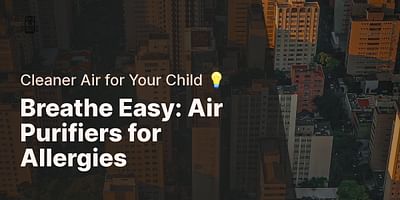Victoria is a qualified air quality expert boasting over a decade of professional experience in the field. She harbours a deep passion for enhancing the quality of air people breathe and takes pride in imparting her extensive knowledge through writing and public speaking. Victoria's expertise is a valuable resource for Air Purifier Inc.
It's quite unusual to get sick after using a new air purifier for just an hour. However, there could be a few reasons why this might have happened. Let me walk you through some possible explanations and what you can do to prevent it from happening again.
Firstly, it's essential to ensure that your air purifier is properly set up and functioning. Make sure you've followed the manufacturer's instructions for installation, including removing any packaging materials and filters' plastic wraps. If the air purifier isn't working correctly, it might not be cleaning the air as it should, leading to potential discomfort or illness. If you're unsure about the correct setup, you can refer to our ultimate guide to selecting the perfect air purifier for your home, which includes maintenance and cleaning tips.
Another possibility is that you might be experiencing a temporary adjustment period to the cleaner air. When you first start using an air purifier, it begins removing pollutants and allergens from the air. This sudden change in air quality can sometimes cause mild symptoms like sneezing, coughing, or a runny nose as your body adjusts. These symptoms should subside within a few days as your body gets used to the cleaner air. To understand more about how air purifiers work, you can check out our FAQ on how air purifiers work.
It's also worth considering if you have any allergies or sensitivities to specific materials used in the air purifier or its filters. Some people might be sensitive to certain filter materials, such as activated carbon or synthetic fibers. If you suspect this might be the case, try switching to a different type of filter or air purifier and see if your symptoms improve. Our article on the benefits of different types of air purifiers can help you understand which type might be best for you.
Another factor to consider is the ozone production by the air purifier. Some air purifiers, especially those using ionizers or ozone generators, can produce ozone as a byproduct. Ozone can be harmful to your health and cause respiratory issues if inhaled in high concentrations. Make sure your air purifier is certified to produce minimal or no ozone, and consider choosing a model that uses HEPA filtration instead of ionization or ozone generation. If you're concerned about the safety of your air purifier, you can refer to our FAQ on the safest air purifiers.
Lastly, it's essential to keep your air purifier clean and well-maintained. Dirty filters or a buildup of dust and debris inside the unit can reduce its effectiveness and potentially release contaminants back into the air. Follow the manufacturer's guidelines for cleaning and replacing filters to ensure your air purifier stays in top working condition. If you're not sure how often you should run your air purifier, you can refer to our FAQ on how often you should run your air purifier.
In conclusion, while it's uncommon to get sick after using a new air purifier for a short period, there could be several reasons for this occurrence. By ensuring proper setup, giving your body time to adjust, checking for allergies or sensitivities, avoiding ozone-producing models, and keeping your air purifier clean, you can help prevent any future issues and enjoy the benefits of cleaner air in your home.















